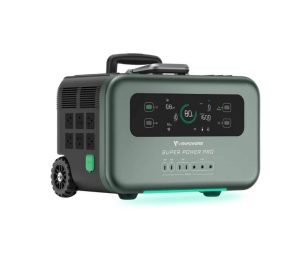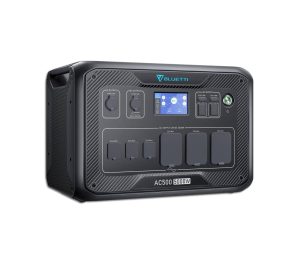Electric cars have come a long way in recent years. They can now travel further on a single charge than ever before. However, for EV owners that are looking to travel more than 200 miles at a time, running out of energy while on the road is still a major concern.
One popular solution for this problem is to use a portable power station. These devices can be used to quickly recharge your EV when traditional charging stations are not available. Additionally, they make great emergency devices because they are versatile and can be recharge quickly.
This article provides a list of portable power stations and estimates the number of miles each one can provide for your EV.
Here’s our list the best portable power stations for emergency EV charging:
1. Vanpowers Super Power Pro 2000 Portable Power Station »

- The power station has a battery capacity of 2 kilowatt hours, which can provide approximately 8 miles of charge.
- Retail price is $1,599
2. Jackery Solar Generator 2000 Pro »

- The power station has a battery capacity of 2.16 kilowatt hours, which can provide approximately 8.64 miles of charge.
- Retail price is $2,099
3. EcoFlow DELTA Pro »

- The power station has a battery capacity of 3.6 kilowatt hours, which can provide approximately 14 miles of charge.
- Retail price is $3,699
4. BLUETTI AC500 »

- The power station has a battery capacity of 5 kilowatt hours, which can provide approximately 20 miles of charge.
- Retail price is $2,599
5. Goal Zero Yeti 6000X »

- The power station has a battery capacity of 6 kilowatt hours, which can provide approximately 24 miles of charge
- Retail price is $5,999
Keep in mind that portable power stations are an expensive investment and should not be the primary way you charge your EV.
However, they are an invaluable tool to make sure you’re always prepared for emergency situations like power outages due to bad weather, off-grid eco camping or special outdoor events.
What is an emergency portable electric car power supply?
Using a portable power station to charge your EV is the equivalent of having a spare gas tank in the trunk of your car. You won’t be able to fully recharge your EV back to 100%, but it will provide a short term boost so you can safely reach your destination or a public charging station.
You should be able to charge your EV in less than 30 minutes, assuming the power station is in good working condition.
Portable power stations are an expensive investment and should not be the primary way you charge your EV.
However, they are an invaluable tool to make sure you’re always prepared for emergency situations like power outages due to bad weather, off-grid camping or special outdoor events.
What you should consider before buying your portable power station:
- Make sure the power station delivers Pure Sine Wave. Some electric cars, like any Tesla model, require pure sine waves. This is a steady, continuous flow of energy that is not modified or interrupted. Using modified sine waves can damage your EV battery and potentially make the vehicle unusable.
- Use an RV Adaptor Cable & Ground Plug to safely connect the power station to the EV – You’ll need additional gear to connect your EV to a portable power station. These include an RV adaptor cable (about $40) and a neutral ground plug (about $15). The RV cable allows you to connect the EV mobile charging cable to the portable power station. Plug the neutral ground plug into any of the power station’s AC inputs.
- Use solar panels to recharge your power station when you’re off grid. Many power stations offer dual charging so that you can recharge while you charge your EV.
- A power station can deliver about 4 miles per 1 kilowatt hour of energy. Thus, if a power station has battery capacity of 2 kilowatt hours, it can deliver 8 miles of energy to the EV.
What makes a good emergency electric car power supply?
- Firstly, it should have a capacity of at least 1 kilowatt hours or 1,000 watts of power. This equates to roughly 4 miles of energy for the EV. Ideally, your emergency power supply should have a 2 kilowatt hours, 2,000 watts, or more.
- Secondly, it should be easy to operate and maintain. If the power supply is heavy, it should come equipped with handles or wheels so that you can transport easily.
- Thirdly, it should be reliable and robust, able to withstand extreme weather conditions and rough handling.
How do you choose the best portable power stations for emergency EV charging?
- First, you’ll want to consider the size and capacity of the unit. A larger unit will be able to provide more energy, but may be significantly more expensive.
- Second, you’ll want to consider the portability of the unit. A unit that is easily portable will be more convenient in an emergency situation.
- Finally, you’ll want to consider the price of the unit. A more expensive unit may have more features and a longer warranty, but a less expensive unit may be just as effective in an emergency situation.






